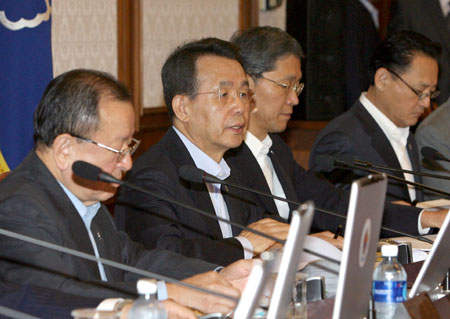The ongoing beef crisis in South Korea, and more fundamentally the public distrust of some cabinet members and their mishandling of administrative affairs, have forced the South Korean cabinet to resign collectively Tuesday, media reports and analysts say.
Prime Minister Han Seung-soo, who only took office on February 29, tendered his and the cabinet ministers' resignations to President Lee Myung-bak to take responsibilities for the political turmoil caused by the April 18 US beef imports deal, which would unconditionally lift a ban on US beef imports to South Korea.

South Korea's Prime Minister Han Seung-soo (C) presides over a cabinet council meeting at the Integrated Government Complex in Seoul June 10, 2008. The entire South Korean cabinet Tuesday offered its resignation to President Lee Myung-Bak over US beef dispute, Yonhap news agency reported. (Xinhua/AFP Photo)
Tens of thousands of South Koreans have held candlelight vigils almost daily since early May, calling for the scrapping of the deal to protect them from potential mad cow disease. Thousands more joined street rallies throughout the country on Tuesday night, repeating their appeals and even demanding the president's resignation.
It seems the government's stance on US beef imports triggered the political crisis for the most part, but some South Korean media tried to look beyond the beef issue and unveil other deeper causes.